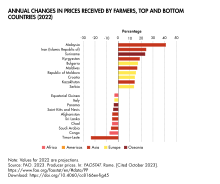Farmer
grazier (Australia) or stockman |
Rural Society |
|---|
A farmer is a person engaged in
Over half a billion farmers are
History
Farming dates back as far as the
Advancements in technology

In the US of the 1930s, one farmer could produce only enough food to feed three other consumers. A modern farmer produces enough food to feed well over a hundred people. However, some authors consider this estimate to be flawed, as it does not take into account that farming requires energy and many other resources which have to be provided by additional workers, so that the ratio of people fed to farmers is actually smaller than 100 to 1.[8]
Types

More distinct terms are commonly used to denote farmers who raise specific
In developed nations, a farmer (as a profession) is usually defined as someone with an ownership interest in crops or livestock, and who provides land or management in their production. Those who provide only labor are most often called farmhands. Alternatively, growers who manage farmland for an absentee landowner, sharing the harvest (or its profits) are known as
Techniques
In the context of
In
Farming organizations

Farmers are often members of local, regional, or national farmers' unions or agricultural producers' organizations and can exert significant political influence. The
Youth farming organizations

There are many organizations that are targeted at teaching young people how to farm and advancing the knowledge and benefits of sustainable agriculture.
- 4-H was started in 1902 and is a U.S.-based network that has approximately 6.5 million members, ages 5 to 21 years old, and is administered by the National Institute of Food and Agriculture of the United States Department of Agriculture (USDA).
- The National FFA Organization (formerly known as Future Farmers of America) was founded in 1925 and is specifically focused on providing agriculture education for middle and high school students.
- Rural Youth Europe is a non-governmental organization for European youths to create awareness of rural environmental and agriculture issues, it was started in 1957 and the headquarters is in Helsinki, Finland. The group is active in 17 countries with over 500,000 participants.
Income

Farmed products might be sold either to a
Occupational hazards

There are several occupational hazards for those in agriculture; farming is a particularly dangerous industry.
Etymology
The word 'farmer' originally meant a person collecting taxes from tenants working a field owned by a landlord.[15][16] The word changed to refer to the person farming the field. Previous names for a farmer were churl and husbandman.[17]
Gallery
See also
References
- Notes
- ^ Dyer 2007, p. 1: "The word 'farmer' was originally used to describe a tenant paying a leasehold rent (a farm), often for holding a lord's manorial demesne. The use of the word was eventually extended to mean any tenant or owner of a large holding, though when Gregory King estimated that there were 150,000 farmers in the late seventeenth century he evidently defined them by their tenures, as freeholders were counted separately."
- ^ "Operating model – ifad.org". www.ifad.org. Archived from the original on 2013-05-05. Retrieved 2018-01-02.
- ^ HLPE, Committee on World Food Security ,Rome (June 2013). "Investing in smallholder agriculture" (PDF). fao.org. Retrieved 23 February 2021.
{{cite web}}: CS1 maint: multiple names: authors list (link) - ^ "SOFA 2017 - The State of Food and Agriculture". www.fao.org. Retrieved 2021-03-08.
- ^ By the sweat of thy brow: Work in the Western world, Melvin Kranzberg, Joseph Gies, Putnam, 1975
- ^ Nicholson (2000) p. 514
- ^ "Breeds of Livestock - Oklahoma State University". Ansi.okstate.edu. Archived from the original on 2011-12-24. Retrieved 2011-12-10.
- ^ Kirschenmann 2000.
- ^ Oxford English Dictionary
- ^
Bailey, Garrick; Peoples, James (11 January 2013). Essentials of Cultural Anthropology (3 ed.). Cengage Learning (published 2013). pp. 121–122. ISBN 9781133603566. Retrieved 2019-10-10.
Peasants [...] are looked down on by higher classes ("he has a peasant mentality").
- ^ "About the International Federation of Agricultural Producers". Archived from the original on August 7, 2008.
- ^ "Agricultural Safety". NIOSH. December 15, 2014. Archived from the original on October 28, 2007.
- ^ "Insects and Scorpions". NIOSH. February 24, 2012. Archived from the original on September 3, 2015.
- S2CID 51719997.
- Oxford Dictionaries. Archived from the originalon December 26, 2019.
A person to whom the collection of taxes was contracted for a fee
- Merriam–Webster's Dictionary of English Usage.
- ^ "farmer | Origin and meaning of farmer by Online Etymology Dictionary". www.etymonline.com.
- Bibliography
- JSTOR 40276126.
- Kirschenmann, Frederick (2000). "How many farmers will we need?" (PDF). Leopold Letter. 12 (4): 3–4. Archived from the original (PDF) on 2012-05-02.



